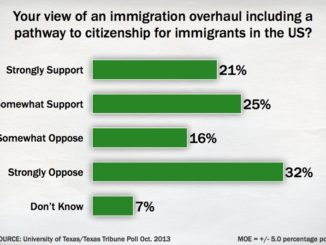
by Laura Collins
The Trump administration announced that it will rescind Deferred Action for Childhood Arrivals (DACA), the Obama administration program that protects undocumented immigrants who were brought to the U.S. as children. The administration will end the program in six months, giving Congress a small window in which to act to codify this program.
We know that immigration can be used as a tool for stronger economic growth. While there are many moral arguments in favor of protecting children brought to the U.S., the Dreamers, we should not forget that legalizing these young immigrants is good economic policy, too.
Unsatisfied that the DREAM Act had not passed Congress, President Obama created DACA with executive action in 2012. The goal was simple: to protect Dreamers from deportation and give them the ability to work legally. Among other requirements, applicants had to have arrived in the U.S. before their 16th birthday; been continuously present in the U.S. since 2007; in school, have a high school diploma or GED, or be honorably discharged from the military; and have no felony or significant misdemeanor convictions. An estimated 800,000 Dreamers have signed up for DACA since its inception.
The legal work permit is one of the most important parts of the DACA program from an economic perspective. These work permits allow Dreamers to be full participants in the economy. They can work at jobs that match their skills and education rather than a job that will not ask about legal status. These jobs have higher wages, meaning individuals have more money to invest or spend, and they have more opportunity. Their higher wages also mean more tax revenue for state, local and federal coffers.
Dreamers help our long term economic prospects, too. Dreamers are young. With an aging and rapidly retiring work force, allowing these immigrants to stay in the country helps lower the overall age of our labor force, helping to delay the negative economic effects that will result if we cannot maintain or grow our labor force.
Unless Congress acts, rescission will have a negative economic impact. The deportations that are likely to result will remove up to 800,000 workers from the economy—almost 1% of our workforce—causing it to contract. These negative effects would ripple across housing markets, retail, and the rest of the economy.
Estimates vary on the economic impacts of DACA. In a new analysis for the American Action Forum, Ben Gitis estimates that the cost of deporting all potential DACA participants is $50 billion. These deportations would result in a loss of $175 billion, or one percent, of GDP by 2020. Similarly, in an early 2017 analysis for the Cato Institute, Ike Brannon and Logan Albright estimated that DACA recipients have a $215 billion impact on U.S. GDP. Rescission and deportation will have a huge potential impact, with the lost GDP growth and estimated deportation expense costing the U.S. up to $283 billion over 10 years. That’s over $28 billion per year in American goods and services not bought.
While these analyses show different orders of magnitude, they both come to the conclusion that policies affecting Dreamers impact the economy.
Deportation is not only expensive—it is time-consuming. Dreamers’ deportation cases could tie up immigration courts for years, exacerbating an already intense backlog and driving up the costs of removing these immigrants to their “home” countries.
While well-intentioned, executive action to protect Dreamers was always less secure than legislation. It was vulnerable to intense legal challenges from opponents, and any successive administration could reverse the actions at the stroke of a pen, ripping away the lives these young immigrants have built for themselves over the last five years. We will see these very real consequences if Congress cannot come to an agreement.
Congress has several legislative alternatives ready for debate. But six months is a very short amount of time on the legislative calendar. With other big priorities—the budget, the debt ceiling, Harvey relief, and tax reform, to name a few—it will be very difficult for Congress to pass a bill to protect Dreamers while also keeping these other important issues on the agenda.
Protecting Dreamers through executive action was never the best solution. With the program’s end pending, Congress must move swiftly to ensure these DACA-recipients can keep the gains they made while on the program. If Congress is successful, legislation to protect Dreamers will be a good first step in making immigration a tool for stronger economic growth.
Laura Collins is the Deputy Director, Economic Growth at the George W. Bush Institute



